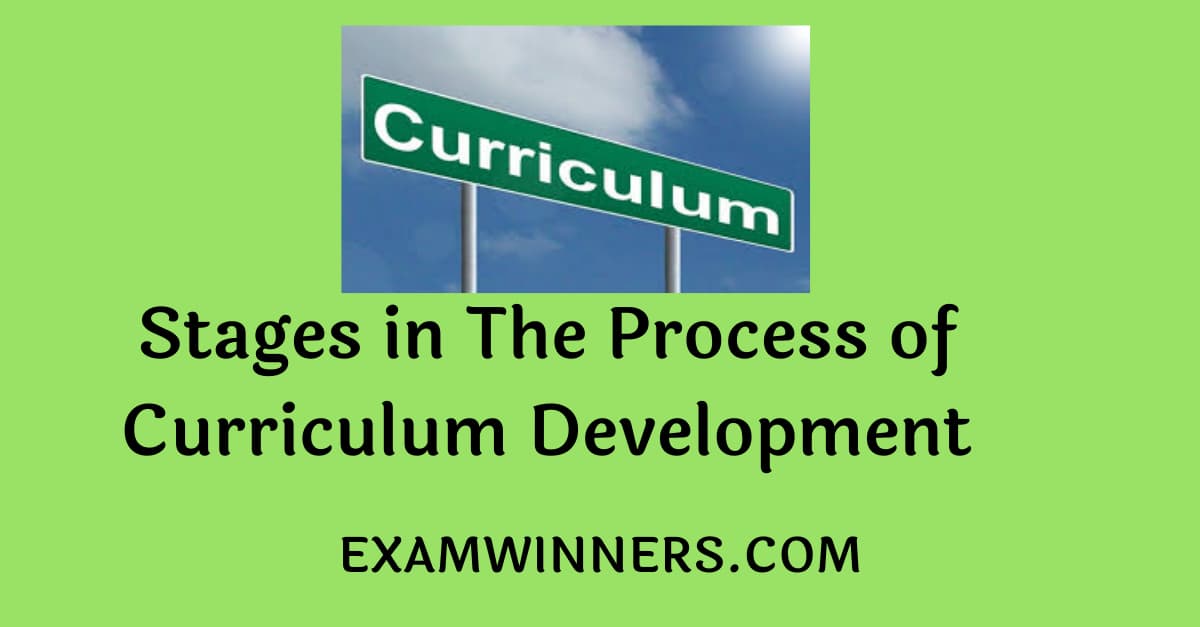This article will answer the following questions-
Q- What is the process of curriculum development?
Q- What are the stages in the process of curriculum development?
Q- Describe different steps of curriculum development in brief.
Q- What is the process of curriculum development in India?
Process of Curriculum Development
Curriculum development is a process in which different components such as formulation of curriculum policy, curriculum research, curriculum planning, its implementation and then its evaluation play an important role. The curricular framework generates creative thinking at various levels of decision making such as the national, state regional and district levels. It provides a great deal of flexibility to provide space for local specificity and contextual realities.
International experiences have shown that neither the completely centralised approach nor the totally decentralised approach to curriculum development has really been successful.
The impact of the school curriculum is so crucial for national and state policies that in most of the countries of the world this responsibility is shouldered by various government and national level organizations and agencies. In fact, no country can afford to ignore the curriculum development process.
Stages in The Process of Curriculum Development
There are basically four stages of curriculum development –
- Formulation of Objectives
- Selection and Organization of appropriate learning-material.
- Selection of Suitable Learning Experiences
- Selection of Suitable Material for evaluation of curriculum
Formulation of Objectives-
The objectives of teaching mathematics formulated and determined in behavioural terms. While formulating and determining objectives following points should be kept in mind-
- That the set of objectives formulated should indicate both the desired behavior and the type of situation in which it is to occur.
- An objective should be expressed in terms of desired pupil behaviour rather than of teacher behaviour.
- An objective should be specifically stated so that it is possible to infer some appropriate learning activities.
Selection and Organisation of Appropriate Learning-Material
The selection of suitable content depends to a great extent on the extent on those basic considerations that underlie in the formulation of objectives. For eg- The objectives recognize four significant aspects of mathematical learning-
- Contents or meanings
- Computational skills
- Problem-solving(reasoning), and
- Mathematical attitudes
Concepts play an important role in the reasoning and also facilitate the learning of computational skills. Great emphasis should be placed upon those basic concepts and skills of mathematical thinking and problem-solving that most people should know in order to function intelligently as members of society.
Selection of Suitable Learning Experiences –
The concept of learning-experience as it emerges from the thinking about the learner and the learning principles accepted as the basis for objectives, can be broadly described as a desired change in the mental makeup of a child and it can be brought about through, “Activities leading to the discovery of connections, relationships and meaning which have significance in the directing or ordering of conduct.” Learning experience, envisaged here, place great importance on the pupil and the learning situation, instead of on the leather and the content. The proper organisation of learning experiences depends upon a number of factors such as-
- Age, needs and previous experiences of the learner.
- Needs of a particular community
- Abilities of the children
- Facility available in the school
- Readiness, maturity and capabilities of the child.
- Attention and interest of the learner
Each teacher should feel free to adjust the objectives, content and activities to suit his requirements. However, the following criteria should be kept in view while selecting and organizing learning experiences-
- Learning experiences should be appropriate to behaviour changes defined under objectives.
- They should be suitable for the content area.
- They should be practicable.
- They should be adequate and effective.
Much reliance is therefore, put on the judgement of the teachers who framed them.
Selection of Suitable Material for Evaluation of Curriculum-
Evaluation and curriculum are regarded as closely related parts of the same educative process, not as distinct and seperate functions.
No curriculum can therefore, be said to have been planned without laying down some basic principles of evaluation. Evaluation comes in at the planning stage when objectives are identified.
The needs, interests, attitudes, and abilities of children should be kept in mind while selecting suitable material for the evaluation of the curriculum.
National agencies like the National Council of Educational Organisation and the Council of Boards of School Education need to undertake the following tasks:
- Laying down the expected levels of attainment in each curricular area of all the stages of school education.
- Developing conceptual materials and prototypes on child-centered, activity-oriented, and competency-based teaching-learning materials;
- Generating various kinds of tests, which could be meaningfully employed for assessing cognitive and non-cognitive learning outcomes, making them available to the state agencies;
- Organizing training programs for paper setters of different boards.
SUMMARY-
Stages in the Process of Curriculum Development-
- Formulation of objectives-
- Give desired pupil behaviour
- Indicate desired behaviour and type and situation
- Infer appropriate learning activities
- Selection and organisation of appropriate learning material
- Concepts
- Skills according to general objectives of particular subject
- Selection of suitable learning experiences-
- Select and clarify objectives
- Select and organise suitable content
- Select appropriate learning situation and activities
- Evaluation of outcomes
- Selection of suitable material for evaluation of curriculum-
- Planning as per-
*Interest
*Needs
*Attitudes
*Abilities
Of the children.
